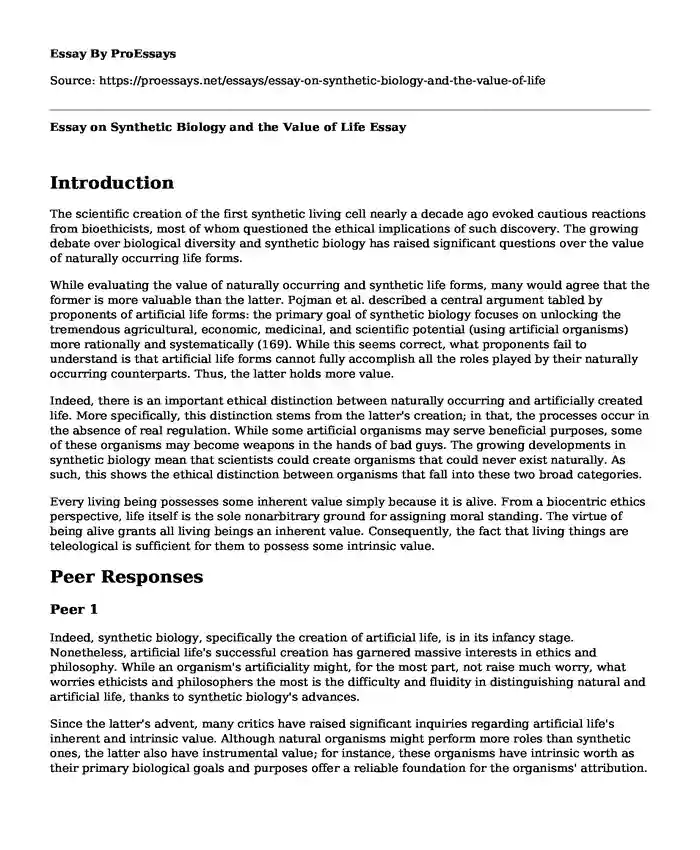Introduction
The scientific creation of the first synthetic living cell nearly a decade ago evoked cautious reactions from bioethicists, most of whom questioned the ethical implications of such discovery. The growing debate over biological diversity and synthetic biology has raised significant questions over the value of naturally occurring life forms.
While evaluating the value of naturally occurring and synthetic life forms, many would agree that the former is more valuable than the latter. Pojman et al. described a central argument tabled by proponents of artificial life forms: the primary goal of synthetic biology focuses on unlocking the tremendous agricultural, economic, medicinal, and scientific potential (using artificial organisms) more rationally and systematically (169). While this seems correct, what proponents fail to understand is that artificial life forms cannot fully accomplish all the roles played by their naturally occurring counterparts. Thus, the latter holds more value.
Indeed, there is an important ethical distinction between naturally occurring and artificially created life. More specifically, this distinction stems from the latter's creation; in that, the processes occur in the absence of real regulation. While some artificial organisms may serve beneficial purposes, some of these organisms may become weapons in the hands of bad guys. The growing developments in synthetic biology mean that scientists could create organisms that could never exist naturally. As such, this shows the ethical distinction between organisms that fall into these two broad categories.
Every living being possesses some inherent value simply because it is alive. From a biocentric ethics perspective, life itself is the sole nonarbitrary ground for assigning moral standing. The virtue of being alive grants all living beings an inherent value. Consequently, the fact that living things are teleological is sufficient for them to possess some intrinsic value.
Peer Responses
Peer 1
Indeed, synthetic biology, specifically the creation of artificial life, is in its infancy stage. Nonetheless, artificial life's successful creation has garnered massive interests in ethics and philosophy. While an organism's artificiality might, for the most part, not raise much worry, what worries ethicists and philosophers the most is the difficulty and fluidity in distinguishing natural and artificial life, thanks to synthetic biology's advances.
Since the latter's advent, many critics have raised significant inquiries regarding artificial life's inherent and intrinsic value. Although natural organisms might perform more roles than synthetic ones, the latter also have instrumental value; for instance, these organisms have intrinsic worth as their primary biological goals and purposes offer a reliable foundation for the organisms' attribution.
Peer 2
As scientists are rapidly moving toward creating a new life – unlike any currently in existence – such a revolution poses the likelihood of raising ethical questions regarding the value of hybrid (a cross between natural and artificial) organisms. These might primarily stem from the phenotypic traits exhibited by the end product. For instance, cross-breeding organisms in the same species could result in viable off springs that could mature and be sexually fertile. Conversely, if the hybrid is the product of different species, then it might exhibit undesirable traits such as infertility during maturity. Thus, the hybrid's value will depend on the type of crossed organisms.
Synthetic biology's fast-paced discoveries are tied to social implications. While this discipline presents numerous applications, its products might raise potential risks to the environment, public health, and national security, highlighting the need for regulation. For instance, the potential of weaponizing this discipline's products should be particularly concerning. As such, limitations to synthetic biology should mainly focus on issues related to harm and public safety.
Work Cited
Pojman Louis P., et al. “Individual biocentrism.” Environmental ethics: Readings in theory and application. 7th ed., Cengage Learning, 2017, pp. 168-215.
Cite this page
Essay on Synthetic Biology and the Value of Life. (2024, Jan 06). Retrieved from https://proessays.net/essays/essay-on-synthetic-biology-and-the-value-of-life
If you are the original author of this essay and no longer wish to have it published on the ProEssays website, please click below to request its removal:
- Hurricanes: Winds Causing Death and Destruction. The Research Paper.
- Annotated Bibliography: Animal Abuse
- Mechanism of Change - Essay Sample
- Essay on EHT: Seeing and Picturing Supermassive Black Holes at High Resolution
- Paper Example on My Nature Escapades: Exploring Waterfalls for Stress Relief
- Nature vs. Nurture: Unveiling the Impact of Genes on Intelligence - Annotated Bibliography
- Essay Example on Deriving the Likelihood Function: Assumptions & Independently Distributed Data







